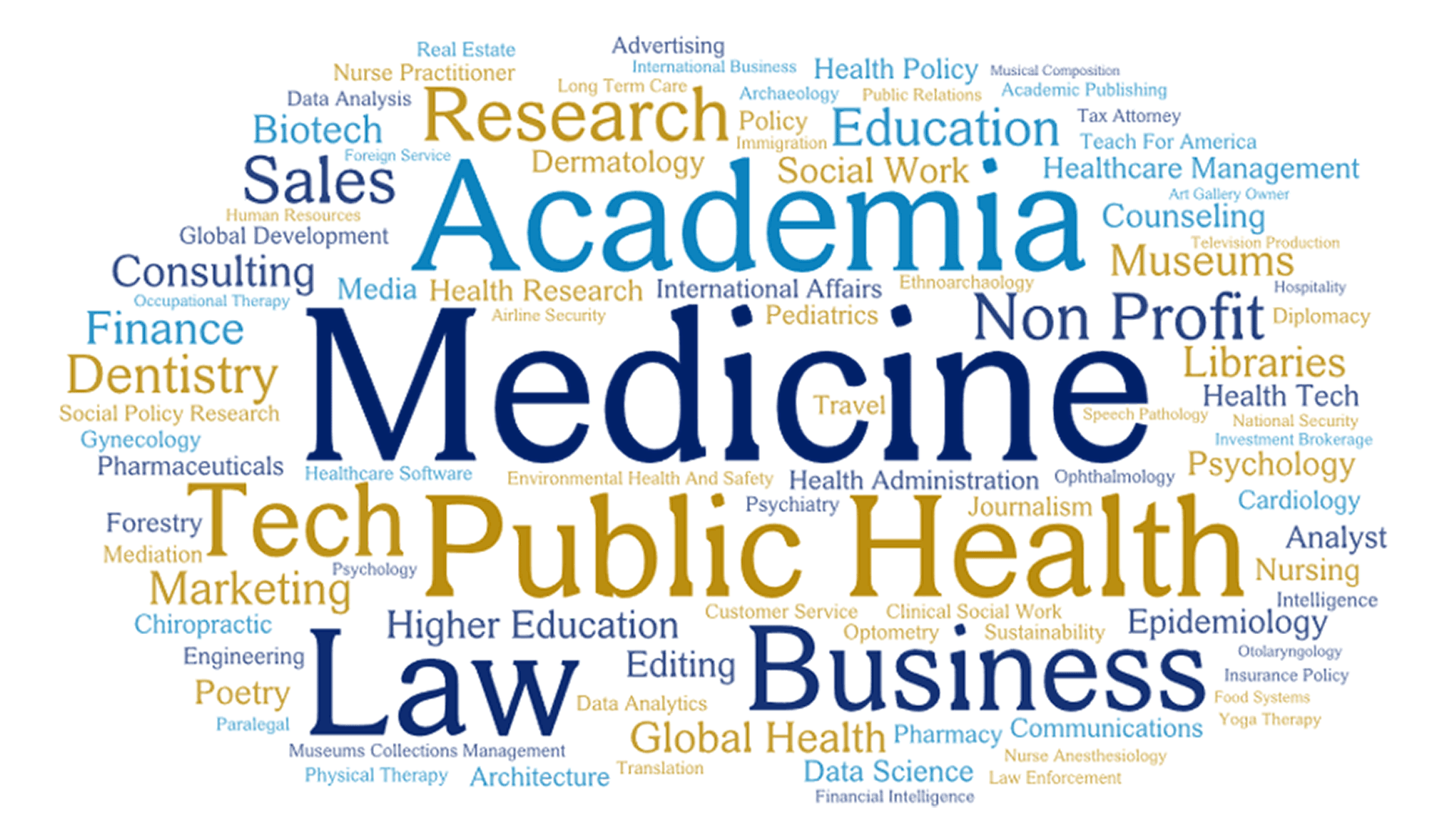
Careers in Anthropology
What can I do with an Anthropology major?
An undergraduate major in Anthropology is a valuable asset in today's job market. Anthropologists are often sought after by business, government, and non-government organizations, particularly international ones, and we find that anthropology graduates are in an excellent competitive position for careers in many fields. Many of our students also fulfill pre-professional requirements and go on to further study in medicine, health, law, or business.
The above graphic represents the self-reported career fields from a recent survey of our undergraduate alumni. Health and medical fields were the most popular among those who reported, but graduates also found themselves in business and marketing, education, law, policy, international affairs, consulting, tech, and a number of other areas, as well as careers in academia. Many respondents cited their broad and cross-cultural understanding and ability to think critically and creatively as being important to their success.
The Captivating and Curious Careers of Anthropology
Check out this video from the American Anthropological Association highlighting careers in Anthropology. You can find more information and resources on the AAA Careers in Anthropology website.
Let's hear from our alumni
We asked our undergraduate alumni about how their anthropology degrees prepared them for what they are doing now. Here is what they said:
Let's hear from our alumni
Sheba Ehteshami (2005, BA) Consultant, Deloitte. | Karly Hampshire (2017, BS) Medical Student, UCSF |
Robert Smith (2011, BS) Resident Physician, Dermatology, UPenn | Kat Landrigan (2001, BA) Clinical Social Worker, Welwynn |
Marissa Strassberger (2008, BA) Research Associate, MDRC | Scott Frank (1993, BA) Associate Producer, Painless Television |
Anthropology helps me have a better understanding of patients I take care of in relation to their cultural backgrounds that could impact decisions they make and their family dynamics. I take care of patients and indirectly their families in some of the most difficult times of their life as a Palliative Care and Geriatrics specialist and having an understanding and appreciation of their background has helped me develop trust and be able to connect with my patients and their families to help them in their healthcare needs and choices.
Neerja Bhardwaj, MD (1996, BS)
Medical Director, DFW region Palliative Care Program
I believe that clinical work in medicine is intrinsically related to anthropology. When patients present with a medical concern, that complaint is usually grounded in medical biology, but it is also impacted by the context of that person's individualized, complex social and cultural history. Every patient has a story.
Robert Smith (2011, BS)
Resident Physician, Dermatology, University of Pennsylvania
Anthropology] has taught me to approach each individual with respect for differences and a desire to fully understand differing experiences. The human biology part of my major allows me to appreciate the millions of years of fine-tuned evolution that created the resilient and adaptive machine that is the human body. It has [also] given me a sense of acceptance, open-mindedness and has made it ok to say "I don't know but I would love to learn - tell me more...". This degree makes me always want to know more, understand more thoroughly and ask beyond the "what" and into the "why".
Emma Neish (2017, BS)
Medical Student, Emory
The foundation that anthropology provided in terms of understanding human behavior and evolution and the role they play in health outcomes was critical. It also helped me understand how environment influences health. Finally, the program made me a critical thinker, improved my writing skills, and gave me a foundation in qualitative and case study research that I still use to this day.
Ashley Marshall (2010, BS)
Public Health Consultant, Deloitte
I deal with people all over the world, and the global perspective from anthropology has been an asset. I would say (and have said to a few) that the skills I acquired in anthropology have better prepared me for working in the global marketplace than many people I have met with traditional MBA's.In the end, business is based on people and relationships and understanding other cultures is more valuable at times than financial or accounting skills.
David Kennedy (1991, BA)
Founder and CCO, Quantum Aviation Solutions
Consulting is - at its core - understanding people. It's defining who they are, what they do, why they do it, and how they want to change it. ...In many ways, learning how people, their groups, their broader organizations, and general societies develop is directly related to getting to the root of what makes people tick. That's what I do for a living, just with a bit of a different spin.
Sheba Ehteshami (2005, BA)
Consultant, Deloitte
I think Anthro trains students to think about the world and their place in it differently than more traditional majors like economics. I have since Emory read and learned quite a bit of finance and Econ but looking at it from a human/cultural perspective helps you think more critically about the various theories many in the field accept blindly as fact, until they’re proven wrong.
Roger Conrad (1983, BA)
Investment Analyst, Partner, Capitalist Times LLC
I find anthropology essential to my current work. First of all, an effective communicator must understand his or her audience. This understanding is, in my opinion, best obtained through qualitative methods. I do a lot of online "social listening" to better understand the field epidemiology community, and I've distributed quite a few surveys to gather insights that inform projects on which I work. Anthropology and marketing really go hand in hand.
More than anything, I think studying anthropology as an undergraduate teaches you 1) the importance of qualitative research, 2) how to think holistically, and 3) how to question everything and ask "why"--all of these have prepared me for what I do now.
Tina Rezvani (2007, BS)
Communications Manager, Task Force for Global Health